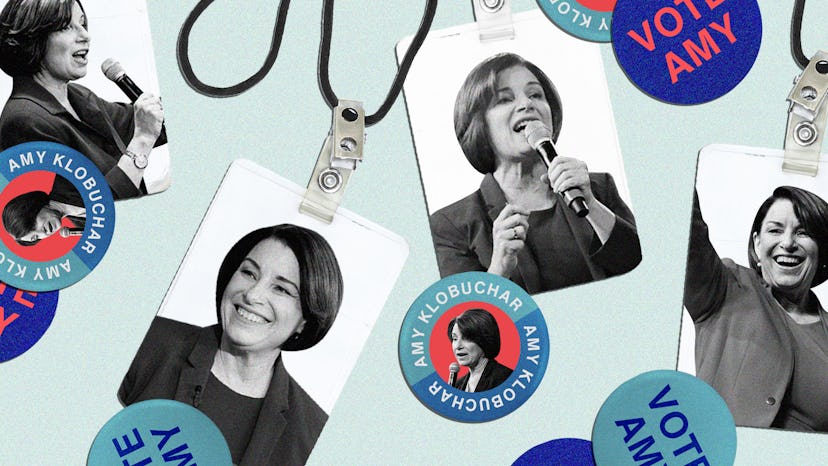News
What’s It Like To Work For Amy Klobuchar? Lots of Hot Spots, Funky Hours, & Unlimited Hand Warmers.

Over the next few weeks in "Backstage Pass: The Millennials Shaping the Primaries," Bustle will publish interviews with 20-somethings on the campaign trail. To read other off-stage, on-the-record stories, click here. First up: Liz Smalley, Senator Amy Klobuchar's chief of staff of communications and digital.
As a senior at the University of Wisconsin, Liz Smalley planned to pursue a career in economics, but after interning in the Washington, D.C. office of Amy Klobuchar for four months, she swapped her graduate school dreams for politics. “It was a transformative experience to see so many women in leadership roles in her office,” Smalley says of working for the Minnesota senator. Back on campus, she had a new mission: Get more women elected to public office. She interned on the reelection campaign for Wisconsin Senator Tammy Baldwin, joining the team full-time after graduating in 2018.
Now, Klobuchar is running for president — one of just three women left in the race — and Smalley, 24, works as her chief of staff of communications and digital. She talked to Bustle about the reality of her job.
You’re the chief of staff of communications and digital. What does that mean?
It’s a lot of coordinating, making sure we have a system [for everything], so that we’re not reinventing the wheel every time we take on a project. We don’t have to ask, “She’s going on national television. What do we do?”
Why did you want to work for Klobuchar?
The senator has won re-election three times with double-digit margins. She’s won in every single congressional district [in Minnesota]. She wins in blue, urban, purple, suburban, and rural areas. She’s also the most effective Democratic senator. Her message is about, “I will stand my ground when I need to, but I will find common ground to get things done.”
How did you join the campaign?
A week before Klobuchar’s launch, the [former] deputy campaign manager for Senator Tammy Baldwin’s reelection campaign, Julia Kennedy, reached out and asked if I wanted to volunteer. I did. She's now [Klobuchar’s] deputy campaign manager. About halfway through that week, I had a conversation with her and Justin Buoen, the campaign manager, and asked if there'd be a place for me on the team. I started working immediately.
What’s been the biggest learning curve about working on a presidential campaign?
We work around the clock. You learn to manage a lifestyle that’s unpredictable and fast-paced, which means relying on a hot spot and making sure you can work immediately if needed.
How much sleep are you actually getting?
Enough! [Laughs] It totally varies. You have to be strategic since people are traveling, [depending on] which time zones they’re in.
What’s been the most unpredictable day so far?
Our launch day was crazy. We picked Boom Island Park, which has the Minneapolis skyline as the backdrop. It’s very picturesque — but it’s outdoors. We were expecting a blizzard. The entire morning we were setting up, the snow was coming down. I ran to a gas station to buy all the hand warmers they had. We wondered, “Are people going to come out?” But Minnesotans showed up in full-body snowsuits. Their dogs showed up in full-body dog snowsuits. People came in on cross-country skis with kids in sleds.
Minnesotans are tough! What’s your favorite memory with the senator?
At the end of summer, she came through Minnesota. We had a big staff barbecue at our campaign manager’s house. We played Spikeball in the backyard. She was in her flannel on the patio. It was fun to take a break.
There have been multiple reports that Senator Klobuchar is a demanding boss. Has that affected your experience working with her?
She loves her staff, and she has expectations. But we’re all a team.
What is it like to work for a female presidential candidate?
It’s incredibly inspiring, especially [seeing] her interactions with young women on the trail. You realize what a big deal representation is. After one of the debates, the senator was on TV and said, “Having all these women on stage is going to change the world.” I believe that.
This interview has been edited and condensed for clarity.
This article was originally published on